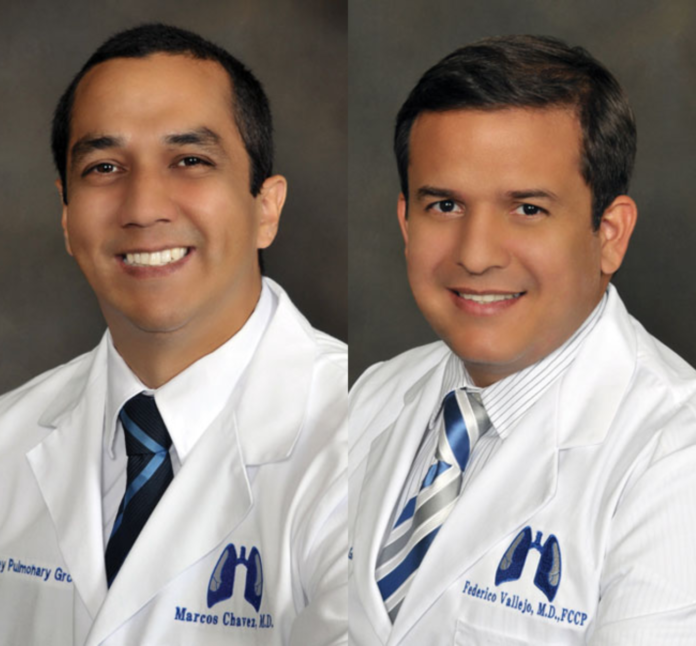Confirmed cases of COVID-19 continue to pop up throughout the Rio Grande Valley with more than 50 reported throughout Hidalgo, Starr, Willacy and Cameron counties.
The four counties have continuously reminded the public to maintain calm and each has implemented their own version of a stay-at-home order as a way to control the spread of the virus.
For doctors in the Valley, those measures are instrumental, explaining that the only way to “defeating” the virus is by people staying at home.
Dr. Federico Vallejo, a pulmonologist and intensivist, said hospitals have spent weeks preparing for a possible outbreak of the coronavirus, but because there haven’t been many hospitalizations among the positive cases, the hospitals haven’t had to deal with the stress of dealing with a shortage of beds or lack of equipment.
One known hospitalization is that of a 31-year-old man from Pharr. Hidalgo County officials said the patient was hospitalized somewhere outside of Hidalgo County but no other details about the location of the facility were disclosed.
Vallejo said they’re hopeful the situation locally won’t be as severe as it has been in major cities.
“Because of a couple of factors — the Valley is more dispersed,” he said. “This is not New York, this is not San Francisco that 1,000 people live together in a building.”
“We still think that we’re going to see cases but not up to that magnitude,” he added.
Vallejo is part of the Rio Grande Valley Physician Task Force – COVID-19, which is comprised of more than 300 healthcare providers from the Valley across all medical systems — Valley Baptist Medical Center, South Texas Health Systems, DHR, and Mission Regional Medical Center, which is part of Prime Healthcare Services.
“We are collaborating and we are working together and the most important message of this group is to tell the general population to stay home as much as possible,” Vallejo said.
Also part of the task force is Dr. Juan Marcos Chavez, another pulmonologist, who is the director of the ICU for Mission Regional Medical Center.
He said the preparation that local hospitals have undergone in recent weeks is unprecedented. That also applies to the cooperation among the physicians in the Valley in sharing information among each other.
“Definitely several changes happening in the past weeks,” Chavez said. “Our hospital systems, they have increased their capacity, equipment are ready, we are ready.”
He said some hospitals had increased their capacity but couldn’t provide exact numbers.
Despite all the preparation, the key lies in the public staying inside, Chavez said.
“We need the community to understand that they need to do their part — they should stay at home,” he said.
When infections and deaths were first reported earlier this year, there was a belief that the virus would affect the elderly or people with pre-existing conditions the hardest.
But Vallejo pointed out that there were cases of people under the age of 50 getting infected with the virus and becoming critically ill.
“It’s not exclusively of the old and the ones that have vulnerabilities or that are immunosuppressed,” he said. “Of course, this group that I’m mentioning right now have much higher rates but what we’re seeing is young people spreading the disease to their parents, to their grandparents and that is the concern here.”
“We need to remove the myth that it doesn’t affect young people; it does affect young people,” he said. “And if it doesn’t affect them enough to go to the hospital, there is a huge risk that they can spread the virus to people that can be absolutely affected and even die from this disease.”
The understanding right now is that about 80% of cases might not require hospitalizations, Vallejo said.
“Of that subset, there’s some that are going to be asymptomatic — they’re not going to have any symptoms but that doesn’t mean that they don’t spread the virus,” he said. “They might be well but they are going to spread the virus to people that are vulnerable.”
Chavez said he believed they were blessed with having the time to prepare.
“We are blessed that this is hitting us later than other states in the north and other countries,” he said. “We are blessed that we have been preparing for this so we can respond, we can cover our needs if the population does their part.”
If people don’t do their part, he said, it will be the number of infected will continue to grow exponentially.
“We need to flatten the curve, that is what is mandatory,” Chavez said. “Flattening the curve requires isolation.”
“We are asking for the community’s help by staying at home.”




